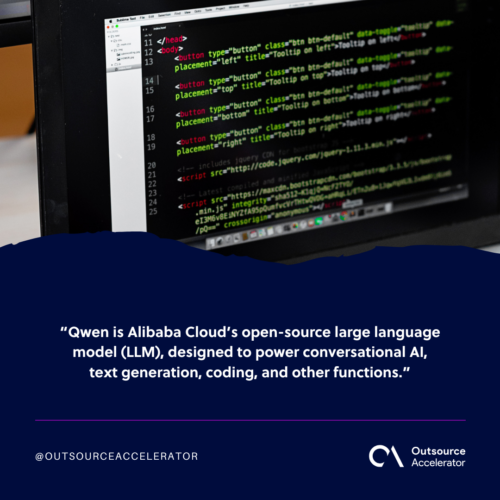What is Qwen? Here’s your intro to Alibaba’s LLM

The world of large language models (LLMs) is getting crowded. OpenAI has ChatGPT, Google has Gemini, and now Alibaba has Qwen.
What is Qwen?
Qwen is one of China’s most advanced LLMs, and it’s worth understanding, especially if you’re exploring alternatives or trying to keep up with the pace of AI development in Asia.
In fact, the World Economic Forum noted that China’s AI strategy shows how AI can foster and urge industrial transformation.
Let’s break down what Qwen is, how it works, what it offers, and how it stacks up against competitors.
What is Qwen?
Qwen is Alibaba Cloud’s open-source large language model (LLM), designed to power conversational AI, text generation, coding, and other functions.
Its name comes from ‘Tongyi Qianwen’ (通义千问), which loosely translates to ‘seeking answers through a thousand questions’ in Chinese.
Alibaba has invested heavily in the Qwen series, constantly releasing new iterations with improved capabilities.
The models range in size and complexity. There are smaller, more efficient versions suitable for deployment on edge devices like smartphones, to powerful ‘Max’ versions that deliver top-tier performance for complex, multi-step tasks.

How does Qwen’s generative AI model work?
Like other LLMs, Qwen works by predicting the next word in a sequence, using a neural network trained on massive amounts of text data.
This includes books, articles, code repositories, and web content. The model learns grammar, syntax, facts, logic patterns, and even subtle writing styles.
Qwen uses transformer-based architecture (close to models like LLaMa developed by Meta AI). It’s the same foundational model behind ChatGPT, Gemini, and Claude. However, Alibaba fine-tunes it with a focus on Chinese-language proficiency and multilingual understanding.
Its latest version, Qwen 2.5 Max, uses a mixture of experts (MoE) approach, similar to DeepSeek and Google’s Gemini 1.5, which allows it to selectively activate parts of the model depending on the task.
This makes it more efficient with faster output, lower latency, and reduced cost per query.
What are Qwen’s top features?
In a world where AI is rapidly becoming the norm, Qwen hopes to stand out with the following features:
1. Multilingual mastery
Qwen models excel in multilingual support, processing, and generating text in over 29 languages, including English, Chinese, Spanish, French, Japanese, Korean, and Arabic.
2. Extended context window
Recent Qwen models, such as Qwen 2.5 Max, can process up to 128,000 tokens in a single input. This extended context window means the model can ‘remember’ and understand large chunks of information, which can result in more accurate and context-aware responses.
3. Superior coding abilities
Qwen models offer robust capabilities in programming. They can generate functional code in multiple languages, debug errors, and even optimize existing code.
4. Improved mathematical reasoning
Qwen has shown significant improvements in logical reasoning and problem-solving, particularly for complex mathematical problems and logical inference.
5. Multimodal capabilities
Some models, like Qwen-VL (Vision-Language), integrate text generation with visual understanding. They can perform tasks such as image captioning, visual question answering, and even OCR (Optical Character Recognition) to extract text from images.
The Qwen2.5-VL series further enhances this, as its capable of analyzing complex documents, charts, and even long video content.
6. Open-source availability (for some models)
While ‘Max’ versions are often proprietary, Alibaba has released several Qwen models as open-source (e.g., Qwen1.5, Qwen2), allowing developers to build on state-of-the-art AI technology, customize models, and foster innovation.
What can you use Qwen for?
You now have the answer to the main question, “What is Qwen?” Now, what can you use Qwen for?
Qwen is built for versatility. You can use it in:
- Customer support automation. Train Qwen on your company’s FAQ and docs to power AI chatbots that speak multiple languages and deliver human-like responses.
- Content generation. Use Qwen to write product descriptions, draft emails, or localize blogs in several languages. It handles tone, clarity, and intent better than earlier models.
- Code writing and debugging. Developers use Qwen as an AI pair programmer. It suggests code, explains functions, and even translates code from one language to another.
- Education and tutoring. Qwen can act as a multilingual tutor. It breaks down topics, quizzes students, and provides answers with detailed reasoning.
- Enterprise knowledge management. Companies plug Qwen into internal data to answer policy questions, summarize reports, or generate summaries for team meetings.

How do I access and use Qwen 2.5 Max?
Qwen 2.5 Max is currently available via Alibaba Cloud. Here’s how to access it:
1. Create an Alibaba Cloud account at alibabacloud.com.
2. To the Tongyi Qianwen (Qwen) product page.
3. Choose your plan. Some tiers offer free trials or pay-as-you-go options.
4. Use the web console or integrate via API into your applications.
Developers can also deploy open-source versions of Qwen on local servers or private clouds. The Qwen GitHub page offers Docker containers, inference scripts, and fine-tuning guides.
For Chinese users, Qwen is also embedded in DingTalk and Tmall Genie, giving it a foothold in enterprise collaboration and smart home devices.
What is Qwen? Qwen vs DeepSeek vs ChatGPT
If you’re comparing models, here’s a quick look at how Qwen stacks up:
| Feature | Qwen 2.5 Max | DeepSeek V2 | ChatGPT-4 (OpenAI) |
| Context Window | 128K tokens | 128K tokens | 128K tokens |
| Open Source? | Yes (Qwen-7B, 72B) | Yes | No |
| Languages | Almost 30 | 20+ | 50+ |
| Coding Benchmarks | High (near GPT-4) | Strong | Best in class |
| China-Based | Yes | Yes | No |
| Cost | Lower | Moderate | Higher |
Qwen is ideal if you want a China-friendly, multilingual, and low-cost solution with coding strength.
In comparison, DeepSeek focuses more on math, reasoning, and academic tasks, and is backed by Tsinghua University alumni.
Further, ChatGPT offers the most polished product experience but is harder to customize and is more expensive.
Does using Qwen put your data at risk?
This is a fair question. When you self-host a Qwen model from Hugging Face or GitHub, your data stays within your environment. Alibaba doesn’t access or collect it.
When you access it through Alibaba Cloud, like any cloud service, your data may be stored or logged temporarily. Alibaba has stated that user prompts and data are not used for training unless explicit consent is given.
Still, for sensitive use cases like legal, medical, or finance, opt for on-premise deployment or private cloud hosting. This gives you full control over compliance, privacy, and encryption.
Alibaba is also ISO 27001, SOC 2, and GDPR compliant. But, always review the data policies for your region and industry.







 Independent
Independent




